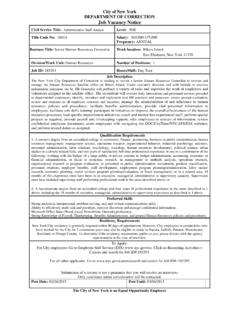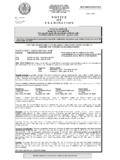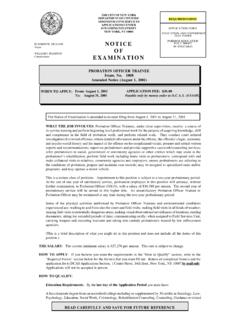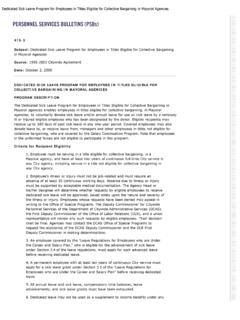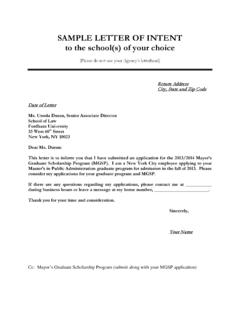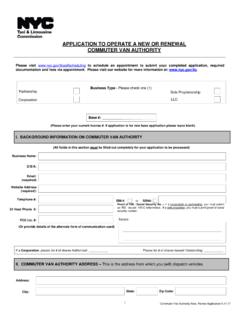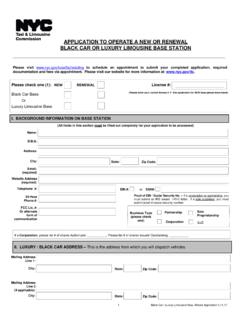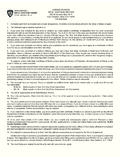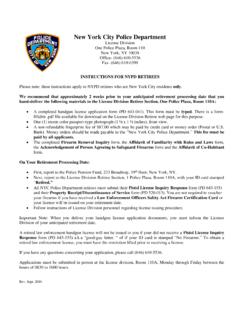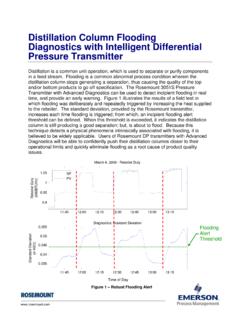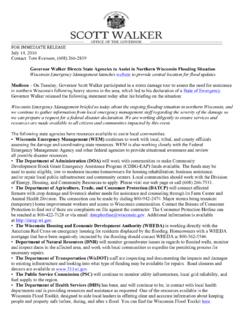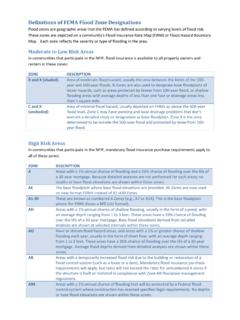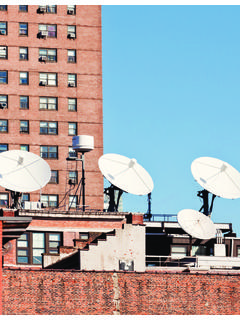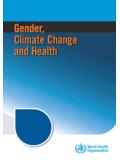Transcription of risk from coastal flooding, which could be …
1 Michael R. Bloomberg, MayorCarter H. Strickland, Jr., Commissioner Bill de Blasio MayorVincent Sapienza, Acting CommissionerWhat causes sewer backups and flooding ? Heavy rain events that rapidly increase water flow into sewers Just as highways can become congested if too many drivers are on the road, the city s sewers can become congested if too much water is trying to enter. When this happens, the flow in the sewers can rise above the level of basement toilets and fixtures, which can result in a sewer backup into your home. Also, catch basins in the street can become blocked and unable to drain stormwater as fast as the rain is coming down, causing local street flooding . Issues with your home s sewer connection Any blockage or break can impair your home s sewer connection or the city sewer s ability to convey stormwater. Pouring used grease or cooking oil down any household drain or flushing anything other than toilet paper and organic waste can cause blockages and increase the risk of a sewer backup.
2 Slope conditions may cause water to flood low points Localized flooding may occur where there are low points on the ground that prevent stormwater from draining properly. If there are low points around the foundation of your home or other pathways to unprotected garage and basement doors below street level, water may find its way into your home. Sidewalks and streets that don t absorb stormwater New York City and other densely populated urban areas are mostly paved. These impervious (non-porous) surfaces do not allow rainfall to be absorbed into the ground. During heavy rains, huge amounts of water flow into sewers very quickly and can overwhelm the system, increasing the risk of localized flooding and sewer you experience sewer backups or flooding not caused by conditions inside your home or property, call 311 to report the problem.
3 Other Tips Consider homeowner s flood insurance Homeowner s insurance policies are all different, and some may not cover damages due to flooding . It is important to check with your insurance provider and consider purchasing a sewer backup or flood insurance policy or rider to your existing policy. This policy or rider could cover the damage and cleanup costs resulting from sewer backups and flooding caused by heavy rain. Elevate or relocate high-value items Consider elevating valuable items in your basement. Put them on shelves or relocate them to a higher floor. Avoid traveling through flooded roadways Streets are designed so that stormwater flows toward catch basins. Sometimes tree roots, construction, and other street defects can cause small pools of water to form. These small pools usually dissipate shortly after it rains; however, in more severe cases street flooding can occur.
4 Never drive or walk through a flooded roadway. To report roadway flooding , please call more information, please visit s Guide to Rain Event Preparedness: Tips to help you protect your home from sewer backups and flooding due to rainfall events11-16 This tip guide provides ideas for how to protect your home from risks associated with rain events. Reducing risk from coastal flooding , which could be associated with major hurricanes, requires consideration of a wider set of preparedness actions. The New York City Building Code has requirements and the Office of Emergency Management has valuable guidance on how to prepare for and reduce risk from these events. HELP KEEP CATCH BASIN GR ATES CLEAR5 INSTALL PROPER ROOF DRAINAGEC onsider a rain barrel!6 REDUCE STORMWATER RUNOFF2 KEEP GREASE OUT OF THE SEWERS4 PROTECT AREAS BELOW STREET LEVELW ater will flow to and pool in low areas.
5 Below street level spaces such as underground garages, basement doors, and other low lying areas are the most vulnerable to flooding . Direct stormwater from your roof and porch away from low-lying areas. Reduce the risk of flooding by sealing cracks in foundation walls and considering the use of appropriate barriers. Sandbags can be a cost effective option to block water from entering some of the spaces in your home. Other barrier options may include window wells, flood walls around doors, and flood gates at driveway entrances. Be sure that any barriers or modifications do not interfere with appropriate exits from your home. KEEP GREASE OUT OF THE SEWERS As a homeowner, you are responsible for the sewer connection from your home to the city sewer. A clogged or cracked sewer connection can prevent wastewater from flowing out of your home properly.
6 Improper disposal of grease and cooking oil can clog your home s internal pipes as well as city sewers. This can cause sewer backups in your neighborhood and home. HELP KEEP CATCH BASIN GRATES CLEARK eeping litter off the street helps stormwater drain and helps protect the city s water bodies. The City is constantly working to maintain our 7,500 miles of sewers and 148,000 catch basins. Street litter is captured in special catch basin collection areas which help keep it from entering into sewers and waterways. DEP cleans and maintains these collection areas on a regular cycle. When debris covers and mats the street level gratings, stormwater cannot enter the catch basin and can pool around the area causing street flooding , even before the sewer is full. You and your neighbors can help reduce this type of flooding by disposing of litter properly and by carefully removing leaves or trash from catch basin grates before or during a rain event.
7 INSTALL PROPER ROOF DRAINAGED irecting stormwater from your roof away from the foundation walls of your home is critical in keeping your basement dry. Clean your gutters regularly to prevent stormwater from overflowing onto walls, and connect downspouts to appropriate drains. Consider installing a rain barrel as an alternative method to capturing stormwater. You can then use this stored water for activities such as watering the lawn or washing your car. Please note that rain barrels alone are not sufficient to reduce flooding during a heavy rain event but when used as a tool in a comprehensive strategy can improve the overall performance of a CHECK VALVECHECK VALVE CLOSED CONSIDER CHECK VALVES1 CONSIDER CHECK VALVES AND OTHER BACKWATER PROTECTION Under heavy rain conditions where the flow in the sewer rises and meets or exceeds the sewer s capacity, basement plumbing fixtures such as toilets, sinks, and drains are vulnerable to sewer backups.
8 A backwater valve, also known as a check valve, can prevent sewer water from rising up from the city sewer into your home through basement plumbing. During heavy rain, if water from the city sewer rises to the level of basement plumbing, the check valve closes and blocks sewer water from entering your home. It is important to note that any wastewater from your toilets, sinks, or showers will not be able to leave your home while the valve is closed. You should not use these fixtures while the valve is closed because you can risk flooding your own property. Drain plugs can be another option to prevent sewer backups into floor drains if they are present on the property. REDUCE STORMWATER RUNOFF Water runs off concrete and asphalt almost immediately and can reach and exceed the design limits of sewers quickly during heavy rains.
9 Retaining and creating green and unpaved spaces around your home can help reduce flows into the sewer by reducing the amount of stormwater runoff your property sends to the sewers. There are alternatives to concrete, such as porous paving stones, which could allow for uses like patios while creating less stormwater runoff. TIP 1 TIP 2 TIP 3 TIP 4 TIP 5 TIP 6 PROTECT AREAS BELOW STREET LEVEL3 This guide provides an overview of some of the causes of water flooding in your home that are associated with rain events. If you have experienced flooding or want to reduce the likelihood it will happen to you, a licensed professional engineer or architect should be consulted to help determine what measures might be most beneficial for your home s unique conditions.
10 Many of the tips below would require permits and approvals and a licensed professional should be consulted to ensure they are properly secured and that appropriate installation techniques are followed.
